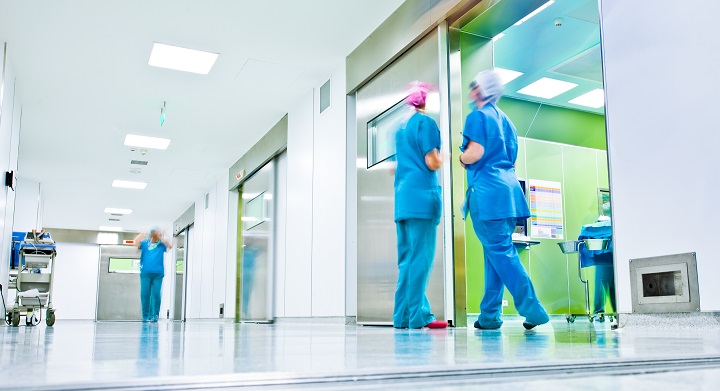Graduate Jennie Smith works in the intensive care unit at the Norfolk and Norwich University Hospital (NNUH), a stone’s throw from campus.
She tells us how things have been in the past few weeks, why she’s living apart from her partner, and how grateful she is for the weekly #clapforcarers.

I’ve worked at NNUH since I graduated in 2010, first in theatre as an anaesthetic practitioner and now in the intensive care unit (ICU). I’ve seen busy periods in the past ten years and though now we have to take extra precautions and wear full PPE – a mask, a visor, a surgical gown, double gloves – I’m just getting on with my work. You always have to think on your feet in the ICU and be prepared for emergency situations. Things can happen here at a much quicker pace so when we started getting COVID patients it didn’t faze me too much – I was already prepared for the emergency scenario, though seeing patients die still hits me hard. That never gets easier.
I’m an operating department practitioner (ODP), which means I’m helping airway doctors set up intubation, quite an important role at the moment. I’m working up to four shifts a week, sometimes as few as two. Each shift is twelve and a half hours and often I’ll work nights, though I’ve been picking up a few day shifts, too. So far I’ve been well during the pandemic and work are very flexible if you need to take the day off or swap shifts.
Initially there were six ODPs in intensive care, but as the workload has increased and we have both positive and negative COVID patients, we’ve taken on three others. We still, of course, have out-of-hospital cardiac arrests coming in or other patients requiring ITU level care who are not necessarily COVID infected. One of our ODPs will therefore stay ‘clean’ during a shift and only attend the clean areas of the hospital. The other will go to the COVID side.
PPE does make things a little more difficult - you get very hot, mentally and physically tired, and it can be more difficult to hear what people are saying. But intubation is classed as an aerosol generating procedure, so that puts you at high risk.
Since this began I’ve been in a hotel ten minutes from work, as my partner is type-one diabetic and is therefore one of the more vulnerable people in the community. As the advice was coming out I was sat at home with him and we were thinking, ‘What am I going to do about work?’ I can’t not go in, it’s my duty, it’s the role that I’ve chosen. So together we made the difficult decision that I would still go to work, but that I would need to spend the time away from home so I don’t pass anything on to him.
The Trust is paying for the hotel and the hotel provide an evening meal. I pop home once a week and drop my washing off, separating my clothes so he can put them in the washing machine without touching them. Then we’ll have a brief chat outside, keeping to the right distance. It’s tough but it’s for the best. I couldn’t live with myself if I brought something back and something happened to him.
When I speak to my partner he often asks if I’ve heard about the recent death toll in the UK – he’s spending a lot of time reading the news. But I’m not really seeing it. This period feels different, of course, but at the same time this is our job, this is what we do. Yes, you go to work and there are more people around and it’s strange having no visitors at the patients’ bedsides, but we’re just getting on with it. And though we’re busier, we’re managing.
We’re seeing an increase in the number of people who require ventilation support but we’re not inundated in the way other parts of the country have been. We’ve created extra capacity in preparation for an influx, ready for a worst-case scenario but hoping for the best.
Everyone I work with is so grateful that the public are showing their appreciation for what we do. I felt very emotional when the first clap for carers happened. I was still at home that week and I stood outside clapping for all the other carers – and everyone working across the community. Thinking about it now still makes the hairs stand up, I can feel my skin tingling. It’s really lovely to hear and feel that appreciation. But at the end of the day when we go back inside we all feel like we’re just doing what we’ve always done.
And people have been so generous with their gifts and donations. We’ve had hand cream, cakes and chocolate – which is always a plus! Thank you for all the appreciation you’ve shown for the health service, and for your support. Getting handed a donated burger or some chocolate at the end of a long shift, or going outside at 8pm and seeing people applauding really puts a smile on your face. Usually I just get in my car and go home. It’s been so nice that people are recognising the work the NHS does.
Finally I’d like to say: stay safe and follow what the government are saying. We really want people to stay indoors. Don’t clap for us on a Thursday and then go to the beach with your friends on the Saturday. You have to stay home. There are silent carriers who could pass it on to someone who ends up under our care in the ICU.
Do you have a story to share? Please email communications@uea.ac.uk

:focus(1811x1796:1812x1797))